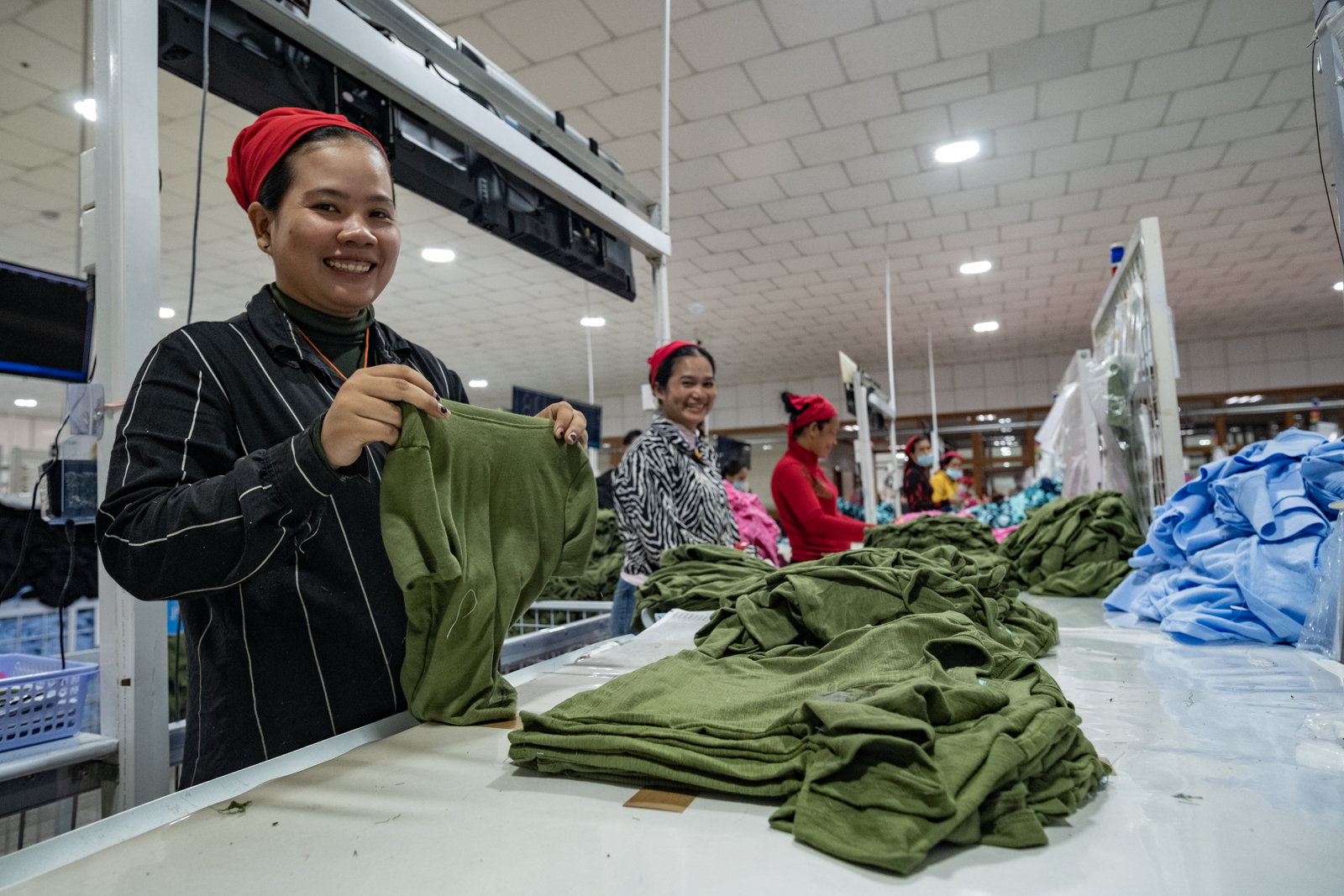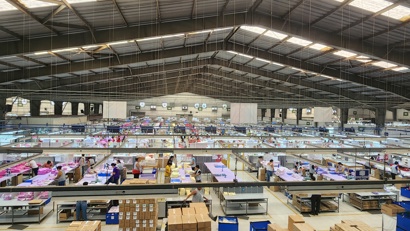
អូសចុះក្រោមសម្រាប់អត្ថបទជាភាសាខ្មែរ
Key points:
- Employers can increase payroll efficiency and save production time through wage digitalization.
- Wage digitalization coupled with financial capability training increases financial inclusion and improves financial health for workers.
- It is vital to consider gender norms during wage digitalization so that both women and men benefit – even when 80% of workers are women.
“Digitizing wages can take time but the benefits for both business and workers are clear. Ensuring factory managers understand the gains from digitizing wages and making sure workers are well supported and receive the right training through the process is crucial.”
Sokha Yun | Senior Specialist Corporate Social Responsibility at Carter's Inc.
As Cambodia continues to embrace the move to a digital economy, wage payment is switching rapidly from cash to digital. For example, in Cambodia’s garment sector, 5 years ago, it was estimated that only 22% of factories paid digital wages, compared to 72% today (Better Factories Cambodia). This is more efficient, more convenient and brings large numbers of unbanked workers into the formal financial system.
RISE and Mastercard Center for Inclusive Growth have been supporting and scaling wage digitalization, that considers the needs of women, in the garment sector in Cambodia since 2019. Through the partnership, 17 garment factories, with over 25,000 workers (85% women), supplying to RISE members have been supported to transition from cash to digital wages, considering the needs of women workers. Workers received training to increase technical knowledge and confidence to use a range of financial products and services. They were also trained on money management skills including planning, budgeting, saving and financial decision making with families. The results show clear benefits to both employers and workers.
Employers are increasing payroll efficiency and saving production time
Following the transition from cash to digital wages, employers reported an 84 percent reduction in payroll admin costs, estimated to be a saving of USD 16,000 a year. The digital payroll also addresses the risk of having to transport and count significant amounts of cash on premises, twice a month on payday.
In addition, workers no longer need to leave the production line to collect their wages, which was estimated to take around 17 minutes per pay day. For an average factory of 1500 workers, this represents a saving of around 850 hours of production time every month.
“When it became mandatory to pay wages to workers twice a month, our admin time on payroll increased significantly. Now we have digitized our payroll it is much faster. We save 2-3 days a month that we would have spent on payroll admin and workers are now saving, buying goods online, transferring money, paying bills and buying insurance for the future of their children.”
Khin Chomnab, Compliance Officer, Sun Hsu
Workers are developing confidence in using financial products and services and managing their money better
Women and men workers reported increased access and usage of financial products and services and improved management of their expenses after the financial capability training. Most workers said they used their account to pay for goods and paying friends or family members.
“I prefer to be paid into an account [than cash wages]. It’s safer and more convenient. I can cash out whenever, pay bills online and top up airtime. I use a QR code to pay merchants. I used to keep my savings [in cash] at home in a cabinet. Now I would keep my savings in a savings account.”
Kam, Garment Worker, Phnom Penh
Workers are now planning for their financial future with their families. The programme has seen significant increases in workers reporting saving regularly, which correlates with workers having a bank account, and being able to keep monies safe. This is especially significant given the high levels of indebtedness in Cambodia.
A higher percentage of women reported making spending decisions with their family following the programme which is very positive given traditional patriarchal gender norms in Cambodia.
What support is needed to scale progress on responsible wage digitalization?
Multistakeholder collaboration that considers the needs of women is key to supporting the scale-up of responsible wage digitalization in Cambodia. Based on learning from five years of financial health programs, RISE has identified the following key considerations:
- Use the RISE Digital Wages Toolkit for Managers for advice on how to set up the factory for digital payroll, prepare your workforce for digitalization and coordinate payday and beyond.
- Promote responsible wage digitalization that considers the needs of women workers: provide support and incentives to encourage factories to digitalize payroll, including reaching non-brand facing factories. This needs to include advice on planning, preparing and delivering the transition from cash to digital wages, in a way that considers the needs of women workers.
- Provide gender responsive financial capability training for workers: The transition to digital wages needs to include gender responsive technical training to enable women and men workers to safely and confidently access and use a range of financial products and services. Take the opportunity to include training on financial planning, budgeting, saving and decision making to enable women and men workers to improve their money management skills and financial resilience. This will increase acceptance of digital payroll accounts by workers, a key part of the transition from cash to digital wages.
- Develop the financial ecosystem to increase opportunities to reduce the reliance on cash. Increasing opportunities to use digital payments will support the commercial viability of payroll accounts. Developing use cases for relevant, affordable and accessible financial products such as merchant payments, money transfers and saving products to increase active usage of accounts. Workers already have high levels of indebtedness so credit or loan products should be carefully considered to avoid exacerbating this.
To find out more about RISE Financial Health and supporting the garment sector in Cambodia to transition from cash to digital wages please contact us.
ការពង្រឹងផ្នែកហិរញ្ញវត្ថុនៅកម្ពុជា៖ ការបង្ហាញពីអត្ថប្រយោជន៍ នៃការបើកប្រាក់ឈ្នួលឌីជីថលដោយមានទំនួលខុសត្រូវនៅក្នុងឧស្សាហកម្មកាត់ដេរ
រៀបរាងដោយ លោកស្រី Charlotte Pallangyo និង លោក Sethypong Sok
ចំណុចសំខាន់៖
- និយោជកអាចបង្កើនប្រសិទ្ធភាពពីការបើកប្រាក់ឈ្នួល និងសន្សំពេលវេលាផលិតកម្មតាមរយៈការបើកប្រាក់ឈ្នួលឌីជីថល។
- ការបើកប្រាក់ឈ្នួលឌីជីថល គួបផ្សំនឹងការបណ្តុះបណ្តាលសមត្ថភាពហិរញ្ញវត្ថុ អាចបង្កើនការរួមបញ្ចូល ផ្នែកហិរញ្ញវត្ថុ និងសុខភាពហិរញ្ញវត្ថុប្រសើរឡើង សម្រាប់កម្មករនិយោជិត។
- មានសារៈសំខាន់ណាស់ក្នុងការពិចារណាលើបទដ្ឋានយេនឌ័រក្នុងអំឡុងពេលការបើកប្រាក់ឈ្នួលតាមឌីជីថលដើម្បីប្រាកដថាទាំងស្ត្រី និងបុរសទទួលបានអត្ថប្រយោជន៍ - ទោះបីជាកម្មករនិយោជិត 80% ជាស្ត្រីក៏ដោយ។
« ការបើកប្រាក់ឈ្នួលឌីជីថលអាចត្រូវការពេលវេលាក្នុងការរៀបចំ ប៉ុន្តែវាពិតជាមានអត្ថប្រយោជន៍ទាំងអាជីវកម្ម និងកម្មករនិយោជិត។ ជារឿងសំខាន់ដែលត្រូវធានាថា អ្នកគ្រប់គ្រងរោងចក្របានយល់ច្បាស់ពីផលចំណេញពីការបើកប្រាក់ឈ្នួលឌីជីថល និងប្រាកដថាកម្មករនិយោជិតត្រូវទទួលបានការគាំទ្រ និងទទួលបានការបណ្តុះបណ្តាលត្រឹមត្រូវតាមរយៈដំណើរការនេះ»។
លោកស្រី យន់ សុខា | អ្នកឯកទេសជាន់ខ្ពស់ផ្នែកទទួលខុសត្រូវសង្គមរបស់ក្រុមហ៊ុន CARTER'S INC
ប្រទេសកម្ពុជាកំពុងបន្តទទួលយកការផ្លាស់ប្តូរទៅកាន់សេដ្ឋកិច្ចឌីជីថល ក្នុងនោះការផ្លាស់ប្តូរយ៉ាងឆាប់រហ័សមួយគឺ ការបើកប្រាក់ឈ្នួលពីសាច់ប្រាក់ទៅតាមប្រព័ន្ធឌីជីថល។ ជាឧទាហរណ៍ ក្នុងវិស័យកាត់ដេរនៅកម្ពុជាកាលពី 5 ឆ្នាំមុន គេប៉ាន់ប្រមាណថាមានតែ 22% នៃរោងចក្រប៉ុណ្ណោះដែលបានបើកប្រាក់ឈ្នួលឌីជីថល បើធៀបនឹង 65% នៅពេលនេះ (គម្រោងរោងចក្រកាន់តែប្រសើរនៅកម្ពុជា)។ ការផ្លាល់ប្តូរនេះគឺបានជួយដល់ វិស័យនេះអោយកាន់តែមានប្រសិទ្ធភាព មានភាពងាយស្រួលជាងមុន និងជាចំណែកជួយដល់កម្មករនិយោជិតជាច្រើនដែលមិនមានគណនីធនាគារអោយចូលទៅក្នុងប្រព័ន្ធហិរញ្ញវត្ថុផ្លូវការ។
ចាប់តាំងពីឆ្នាំ 2019 មក RISE និង Mastercard Center for Inclusive Growth បាននិងកំពុងគាំទ្រ និងលើកកម្ពស់ប្រាក់ឈ្នួលឌីជីថល ដែលគិតគូរពីតម្រូវការរបស់ស្ត្រី ក្នុងវិស័យកាត់ដេរនៅកម្ពុជា។ ភាពជាដៃគូនេះបានជួយដល់រោងចក្រកាត់ដេរចំនួន 17 ដែលមានកម្មករជាង 25,000 នាក់ (ស្ត្រី 85%) តាមរយៈសមាជិករបស់ RISE ក្នុងការគាំទ្រក្នុងការផ្លាស់ប្តូរពីការបើកប្រាក់ឈ្នួលជាសាច់ប្រាក់ទៅជាឌីជីថល ដោយគិតពីតម្រូវការចំប្បងរបស់កម្មករស្ត្រី។ កម្មករនិយោជិតបានទទួលការបណ្តុះបណ្តាលដើម្បីបង្កើនចំណេះដឹងបច្ចេកទេស និងទំនុកចិត្តក្នុងការប្រើប្រាស់ផលិតផល និងសេវាកម្មហិរញ្ញវត្ថុជាច្រើន។ ពួកគេក៏ត្រូវបានបណ្តុះបណ្តាលលើជំនាញគ្រប់គ្រងថវិការ រួមទាំងការធ្វើផែន ការថវិកា ការសន្សំ និងការសម្រេចចិត្តផ្នែកហិរញ្ញវត្ថុជាមួយគ្រួសារផងដែល។ លទ្ធផលទាំងនេះបង្ហាញយ៉ាងច្បាស់អំពី អត្ថប្រយោជន៍ដល់និយោជក និងកម្មករនិយោជិត៖
បង្កើនប្រសិទ្ធភាពនៃការបើកប្រាក់ឈ្នួល និងសន្សំពេលវេលាផលិតកម្មដល់និយោជក។
បន្ទាប់ពីការផ្លាស់ប្តូរពីការបើកជាសាច់ប្រាក់ទៅឌីជីថល និយោជកបានរាយការណ៍ពីការកាត់បន្ថយជាមធ្យម 84 ភាគរយនៃការចំណាយលើការគ្រប់គ្រងបញ្ជីប្រាក់ឈ្នួល ដែលត្រូវបានប៉ាន់ប្រមាណថាជាការសន្សំចំនួន 16,000 ដុល្លារក្នុងមួយឆ្នាំ។ បញ្ជីការបើកប្រាក់ឈ្នួលឌីជីថល ក៏បានជួយដោះស្រាយបញ្ហាហានិភ័យនៃការដឹកជញ្ជូននិងរាប់ ចំនួនសាច់ប្រាក់យ៉ាងច្រើននៅក្នុងបរិវេណរោងចក្រ ដែរជាទូទៅត្រូវធ្វើពីរដងក្នុងមួយខែនៅថ្ងៃបើកប្រាក់។
លើសពីនេះ កម្មករនិយោជិត លែងត្រូវការចាកចេញពីខ្សែសង្វាក់ផលិតកម្មរបស់ខ្លួន ដើម្បីទៅទទួលប្រាក់ឈ្នួល ដែលតាមការប៉ាន់ប្រមាណ ចំណាយពេលប្រហែល 17 នាទីក្នុងលើក។ សម្រាប់រោងចក្រជាមធ្យមដែលមានកម្មករ 1500 នាក់ សន្សំពេលវេលាផលិតកម្មបានប្រហែលជាង 850 ម៉ោងជារៀងរាល់ខែ។
“នៅពេលដែលវាក្លាយជាកាតព្វកិច្ចក្នុងការបើកប្រាក់ឈ្នួលដល់កម្មករនិយោជិតពីរដងក្នុងមួយខែ ការចំណាយពេលវេលារបស់អ្នកគ្រប់គ្រង លើការងារនេះត្រូវបានកើនឡើងយ៉ាងខ្លាំង។ ឥឡូវនេះយើងបានធ្វើឌីជីថលប្រាក់ខែ ហើយយើងឃើញថាវាជួយសម្រួលលឿនជាងមុន។ យើងសន្សំពេលបាន 2-3 ថ្ងៃក្នុងមួយខែសំរាប់ការងារនឹង ហើយកម្មករនិយោជិត ចាប់ផ្តើមចេះសន្សំថវិការ ចេះទិញទំនិញតាមអនឡាញ ផ្ទេរប្រាក់ បង់វិក្កយបត្រ និងទិញធានារ៉ាប់រងសម្រាប់អនាគតកូនៗរបស់ពួកគេទៀតផង”។
លោក ឃិន ចំណាប់ មន្ត្រីអនុវត្តច្បាប់ រោងចក្រ Sun Hus
កម្មករនិយោជិតមានទំនុកចិត្តក្នុងការប្រើប្រាស់ផលិតផល និងសេវាកម្មហិរញ្ញវត្ថុ និងចេះគ្រប់គ្រងប្រាក់ឈ្នួលរបស់ពួកគេឱ្យកាន់តែប្រសើរឡើង។
កម្មករស្ត្រីនិងបុរស បានរាយការណ៍ពីការកើនឡើងនៃលទ្ធភាពទទួលបាន និងការប្រើប្រាស់ផលិតផល និងសេវាកម្មហិរញ្ញវត្ថុ និងការកែលម្អការគ្រប់គ្រងការចំណាយជាប្រចាំរបស់ពួកគេ បន្ទាប់ពីចូលរួមវគ្គបណ្តុះបណ្តាលសមត្ថភាពហិរញ្ញវត្ថុ។ កម្មករនិយោជិតភាគច្រើនបាននិយាយថា ពួកគេបានប្រើគណនីរបស់ពួកគេដើម្បីទូទាត់ថ្លៃទំនិញ និងផ្ទេរប្រាក់ឱ្យមិត្តភក្តិ ឬសមាជិកគ្រួសារ។
“ខ្ញុំចង់ទទួលប្រាក់ឈ្នួលតាមគណនីឌីជីថល [ជាងជាសាច់ប្រាក់]។ វាមានសុវត្ថិភាព និងមានភាពងាយស្រួល។ ខ្ញុំអាចដកលុយបានគ្រប់ពេល បង់វិក្កយបត្រតាមអនឡាញ និងបញ្ចូលលុយទូរស៍ព្ទ។ ខ្ញុំប្រើ QRកូដ ដើម្បីបង់ប្រាក់ឱ្យអ្នកលក់។ ពីមុនខ្ញុំសន្សំលុយ [ជាសាច់ប្រាក់] នៅផ្ទះក្នុងទូរ។ ឥឡូវនេះ ខ្ញុំសន្សំ ក្នុងគណនីសន្សំរបស់ខ្ញុំ»។
ខេម កម្មករកាត់ដេរ រាជធានីភ្នំពេញ
បច្ចុប្បន្ន កម្មករនិយោជិត កំពុងរៀបចំផែនការសម្រាប់អនាគតហិរញ្ញវត្ថុរបស់ពួកគេជាមួយគ្រួសាររបស់ពួកគេ។ តាមរយៈកម្មវិធីនេះ យើងបានឃើញការកើនឡើងគួរឱ្យកត់សម្គាល់នៃកម្មករនិយោជិតដែលរាយការណ៍ពីការសន្សំជាប្រចាំ ចំពោះកម្មករនិយោជិតដែលមានគណនីធនាគារ និងអាចរក្សាប្រាក់ឱ្យមានសុវត្ថិភាព។ វាមានសារៈសំខាន់ណាស់ ជាពិសេសដោយសារកម្រិតបំណុលខ្ពស់នៅកម្ពុជាសព្វថ្ងៃ។
ភាពវិជ្ជមានចំពោះបទដ្ឋានយេនឌ័រនៅក្នុងប្រទេសកម្ពុជា គឺភាគរយខ្ពស់នៃស្ត្រីបានរាយការណ៍ពី ការសម្រេចចិត្តលើការចំណាយជាមួយគ្រួសាររបស់ពួកគេ មុននិងបន្ទាប់ពីចូលរួមក្នុងកម្មវិធី ។
តើត្រូវការជំនួយអ្វីខ្លះ ក្នុងការពង្រើកវិសាលភាព ការបើកប្រាក់ឈ្នួលឌីជីថលប្រកបដោយការទទួលខុសត្រូវ?
កិច្ចសហការពីភាគីពាក់ព័ន្ធ ជាតម្រូវការចំបាច់របស់កម្មករនិយោជិតជាស្ត្រីគឺជាគន្លឹះក្នុងការជួយដល់ការបង្កើនទំហំនៃការធ្វើឌីជីថលប្រាក់ឈ្នួលប្រកបដោយការទទួលខុសត្រូវនៅកម្ពុជា។
ផ្អែកលើបទពិសោធន៍កម្មវិធីសុខភាពហិរញ្ញវត្ថុរយៈពេលប្រាំឆ្នាំរបស់RISE បានកំណត់កត្តារសំខាន់ៗដូចខាងក្រោម៖
- ប្រើប្រាស់ឧបករណ៏ RISE Digital Wages Toolkit សម្រាប់អ្នកគ្រប់គ្រង ដើម្បីទទួលបានការណែនាំអំពីរបៀបរៀបចំក្រុមការងារសម្រាប់ការបើកប្រាក់ឈ្នួលឌីជីថល រៀបចំកម្លាំងពលកម្មរបស់អ្នកសម្រាប់ការធ្វើឌីជីថល និងសម្របសម្រួលថ្ងៃបើកប្រាក់ខែ និងលើសពីនេះ។
- លើកកម្ពស់ការធ្វើឌីជីថលប្រាក់ឈ្នួលប្រកបដោយទំនួលខុសត្រូវដែលគិតគូរពីតម្រូវការរបស់កម្មករស្ត្រី៖ ផ្តល់ការគាំទ្រនិងការលើកទឹកចិត្ត ដើម្បីលើកទឹកចិត្តឱ្យរោងចក្រធ្វើការផ្លាស់ប្តូរប្រាក់ឈ្នួលឌីជីថល រួមទាំងរោងចក្រដែលមិនមែនជាអ្នកផ្គត់ផ្គង់របស់ម្ចាស់ម៉ាក។ នេះចាំបាច់ត្រូវមាន ការធ្វើផែនការ ការរៀបចំ និងការបញ្ជូនការផ្លាស់ប្តូរពីសាច់ប្រាក់ទៅប្រាក់ឈ្នួលឌីជីថលតាមរបៀបដែលគិតគូរពីតម្រូវការរបស់កម្មករស្ត្រី។
- ផ្តល់ការបណ្តុះបណ្តាលសមត្ថភាពហិរញ្ញវត្ថុដែលឆ្លើយតបនឹងយេនឌ័រសម្រាប់កម្មករនិយោជិត៖ ការផ្លាស់ប្តូរទៅប្រាក់ឈ្នួលឌីជីថលត្រូវរួមបញ្ចូលការបណ្តុះបណ្តាលបច្ចេកទេស ដើម្បីឆ្លើយតបនឹងយេនឌ័រ ដើម្បីឱ្យកម្មករស្ត្រី និងបុរសទទួលបាន និងប្រើប្រាស់ផលិតផលនិងសេវាកម្មហិរញ្ញវត្ថុជាច្រើនយ៉ាង ប្រកបដោយសុវត្ថិភាពនិងទំនុកចិត្ត។ ឆ្លៀតឱកាសដើម្បីរួមបញ្ចូលការបណ្តុះបណ្តាលស្តីពីការធ្វើផែនការ ហិរញ្ញវត្ថុ ការសន្សំនិងការសម្រេចចិត្តដើម្បីឱ្យកម្មករស្ត្រីនិងបុរស បង្កើនជំនាញគ្រប់គ្រងប្រាក់ និងភាពធន់នឹងហិរញ្ញវត្ថុរបស់ពួកគេ។ នេះនឹងបង្កើនការទទួលយកគណនីប្រាក់ឈ្នួលជីថលសំរាប់កម្មករ ដែលជាផ្នែកសំខាន់មួយនៃការផ្លាស់ប្តូរពីសាច់ប្រាក់ទៅប្រាក់ឈ្នួលឌីជីថល។
- អភិវឌ្ឍប្រព័ន្ធអេកូហិរញ្ញវត្ថុដើម្បីបង្កើនឱកាសកាត់បន្ថយការពឹងផ្អែកលើសាច់ប្រាក់។ ការបង្កើនឱកាសក្នុងការប្រើប្រាស់ ការទូទាត់តាមឌីជីថល នឹងគាំទ្រលទ្ធភាពពាណិជ្ជកម្ម នៃគណនីបើកប្រាក់។ បង្កើតករណីប្រើប្រាស់សម្រាប់ផលិតផលហិរញ្ញវត្ថុដែលពាក់ព័ន្ធ មានតម្លៃសមរម្យ និងអាចចូលប្រើបាន ដូចជាការទូទាត់ពាណិជ្ជករ ការផ្ទេរប្រាក់ និងផលិតផលសន្សំ ដើម្បីបង្កើនការប្រើប្រាស់គណនីសកម្ម។ កម្មករមានជំពាក់បំណុលខ្ពស់រួចហើយ ដូច្នេះផលិតផលឥណទាន ឬប្រាក់កម្ចីគួរតែត្រូវបានពិចារណាដោយប្រុងប្រយ័ត្ន ដើម្បីជៀសវាងការធ្វើឱ្យកាន់តែធ្ងន់ធ្ងរ។
ដើម្បីស្វែងយល់បន្ថែមអំពីកម្មវិធី RISE Financial Health និងជួយដល់វិស័យកាត់ដេរនៅកម្ពុជា ឱ្យផ្លាស់ប្តូរពីការបើកប្រាក់ឈ្នួលជាសាច់ប្រាក់ទៅជាប្រាក់ឈ្នួលឌីជីថល សូមទាក់ទងមកយើងខ្ញុំ។
- Financial Health
- Cambodia
 Sethypong Sok
Sethypong Sok
 Charlotte Pallangyo
Charlotte Pallangyo


